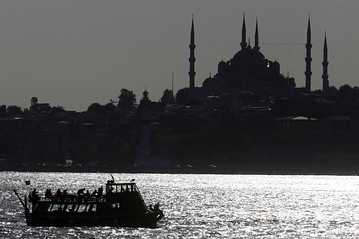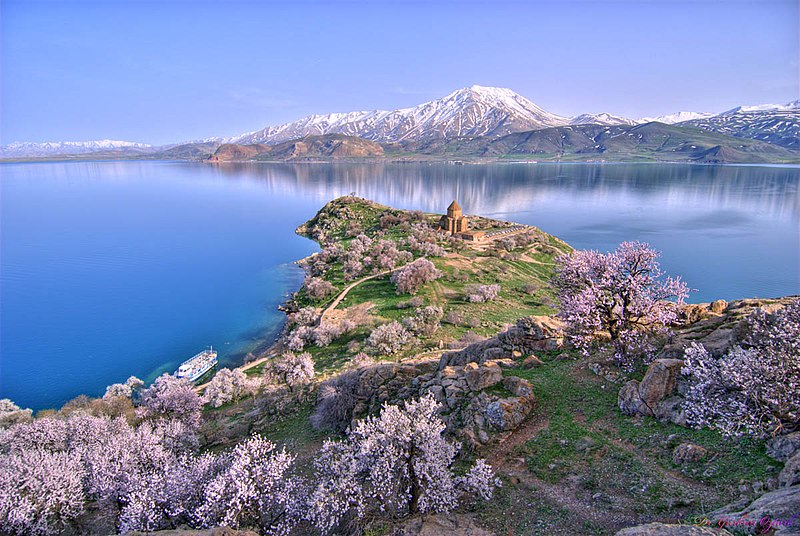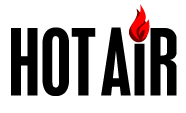 International Center for Journalists continues to realize cross border projects all around the world. One of them is Turkish-Armenian-American journalists exchange program which combines 7 Turkish and 6 Armenian journalists to make them observers in different American media organs. Our author Mehmet Fatih Oztarsu is one of the participants of this project. Every journalists have gone to different regions of the US and they are visitors of American journalists. Oztarsu lives in Florida with his Armenian partner Ofelya Kamavosyan and observes American media mechanism`s differences. He compares business ethics, journalism style and effects of Tallahassee Democrat with the direction of International Center for Journalists. The author shares his observations with interesting points for us: (more…)
International Center for Journalists continues to realize cross border projects all around the world. One of them is Turkish-Armenian-American journalists exchange program which combines 7 Turkish and 6 Armenian journalists to make them observers in different American media organs. Our author Mehmet Fatih Oztarsu is one of the participants of this project. Every journalists have gone to different regions of the US and they are visitors of American journalists. Oztarsu lives in Florida with his Armenian partner Ofelya Kamavosyan and observes American media mechanism`s differences. He compares business ethics, journalism style and effects of Tallahassee Democrat with the direction of International Center for Journalists. The author shares his observations with interesting points for us: (more…)
Tag: DIPLOMACY
-

Turkey shuts down its embassy, revises Libya plans
Turkey has temporarily closed its Tripoli embassy for security reasons, a move that seemed to indicate a change in Ankara’s approach to the Libyan crisis as it loses a key channel of communication with Tripoli and Benghazi.The closure came following attacks on British and Italian diplomatic missions in the Libyan capital over the weekend after a NATO airstrike killed relatives of Col. Moammar Gadhafi.
“Due to the change in the security situation in Libya and the great security risk it poses, our embassy has stopped functioning temporarily and has been evacuated,” Foreign Minister Ahmet Davutoğlu told reporters Monday.
The decision was made late Sunday and Ambassador Levent Şahinkaya and the embassy staff had arrived in Tunisia on Monday morning, he said. “Of course, this does not mean that Turkey’s efforts [to solve the turmoil in Libya] will be halted,” Davutoğlu added.
Turkey’s decision to shut down its embassy came following an increase in attacks by angry crowds after a NATO operation Saturday allegedly attempted to assassinate Col. Gadhafi, instead killing one of his sons and three grandchildren.
Turkey has tried to mediate between the Libyan administration and opposition groups in order to declare a cease-fire and launch a transformation process for reforms. Ankara’s “road map” has, however, failed to produce any results. Davutoğlu said Prime Minister Recep Tayyip Erdoğan was planning to make a substantial statement on Turkey’s efforts to stabilize Libya ahead of the Libya Contact Group meeting slated for Wednesday in Rome.
Closing down the embassy in Tripoli demonstrates an inability for Turkey to keep open communication channels open with the Gadhafi administration based in Tripoli and dissidents based in Benghazi, and may auger poorly for the future of its road map.
Turkey’s road map, which prioritized reaching a truce between the parties, was rejected by Benghazi for not demanding Gadhafi and his family step aside. Following the announcement of the road map, some groups protested Turkey in front of its consulate building.
Turkey subsequently signaled a shift in its position by calling more loudly on Gadhafi and his family to step down and pave the way for defusing the tension, but the closure of the embassy suggests such efforts may have fallen short.
More NATO attacks in Tripoli?
Turkey had been resisting shutting down its embassy in Tripoli, which was also representing the United States, the United Kingdom and Italy. As a member of NATO, Turkey’s decision to leave Tripoli sparked questions about whether the alliance will intensify its military operation against targets in the Libyan capital.
Turkey expressed its concerns after the killing of Gadhafi’s son without directly criticizing NATO’s attacks. In an obvious disagreement with France and United Kingdom, Turkey has insisted on a more careful selection of targets in order not to hurt civilians.
In the second Iraq war, Turkey was the only Western country to keep its embassy open, even during the fiercest military clashes.
Revision of Libya policy
The closure of the embassy in Tripoli in the wake of the NATO airstrike could push Turkey to revise its policy toward the Libyan crisis. Erdoğan will likely give the first clues on any shift in the position Tuesday or Wednesday, messages that will be transmitted to the Western powers by Davutoğlu on Wednesday in Rome, where he will likely hold a bilateral meeting with U.S. Secretary of State Hillary Clinton
-

EU must keep its promise on Cyprus, ex-EU official says
The state of European Union-Turkey negotiations is unsatisfactory, and the EU must act to find a solution to Cyprus and other issues causing barriers to negotiations, according to a former European official.“The state of negotiations is very disappointing,” Günter Verteugen, former EU enlargement commissioner, told a group of journalists on Monday, after a meeting with the state minister and Turkey’s chief EU negotiator Egemen Bağış, in Istanbul’s Ortaköy neighborhood.
Verheugen said it was crucial to keep the process alive and remove any obstacles. “As far as the Cyprus issue, which is one of the main obstacles, the EU has the obligation to implement what it promised in 2004 to the people living on the island,” he said, referring to the EU’s guarantee that Turkish Cypriots would not be victims in the case Greek Cypriots said no to the 2004 referendum on a United Nations Organization’s plan to reunite the island.
“It is not only a promise, this is decided and written on the status book,” Verheugen said, the Cyprus issue had to be solved immediately for negotiations to speed up.
The former commissioner also praised Turkey’s economic progress in the last decade. “Turkey is the fastest growing economy in Europe today, and I think this is important, especially regarding the argument that ‘Turkey would be an economic burden [for the union] if it joined the EU,’ so much more is made of this in the EU political debate.” Verheugen said he believed the key to Turkey’s economic success had been its political stability.
Regarding leaving Turkey outside of the European Commission’s draft EU budget for 2014-2020, Verheugen said he believed the EU was not trying to give any negative political message to Turkey. “The budget [for Turkey if it becomes an EU member within this period] can be accommodated, if negotiations are concluded. It is not the most important point [regarding negotiations].”
-

Russian, Turkish moves increase Armenian isolation
Signs of shifting balances in the Caucasus have been sending alarming signals to Armenia, strengthening its feeling of isolation as the result of new moves by key regional players Russia, Turkey and Azerbaijan.Russia has recently made efforts to improve its relations with Azerbaijan, while Turkey has sought to mend fences between Baku and Tehran over Iranian-Armenian relations, an irritant for Azerbaijan.
Iran provides an important economic outlet for Armenia, which suffers from the blockade by Turkey and Azerbaijan. The Islamic Republic supports its Christian neighbor politically as it feels its large Azerbaijani minority makes it vulnerable in relation to Baku. Ethnic Azerbaijanis are the largest minority in Iran, comprising about a quarter of the population.
Foreign ministers of Turkey, Azerbaijan and Iran met two weeks ago in the northwestern Iranian city of Urmia to try to improve relations.
Efforts by Russia, another country with close relations with Armenia, to improve its ties with Azerbaijan have not gone unnoticed in Ankara, where Turkish diplomats note that the war in Georgia in 2008 has affected Moscow’s overall policies in the Caucasus. Russia wants to improve its relations with Azerbaijan in order to further encircle Georgia, and to create another avenue for reaching out to Iran, the diplomats said. A recent agreement signed between Russia, Azerbaijan and Iran is seen as another indicator of Moscow’s new policies.
The three countries agreed in February to form a joint venture that will be responsible for constructing a 350-kilometer railroad line from Qazvin, northwest of Tehran, to Rasht and the Caspian Sea port of Astara in Azerbaijan. The new line will drastically reduce the distance by rail between Tehran and Baku, while creating a much shorter route between Russia and Iranian ports.
Russia has meanwhile been equally active in trying to find a solution to the ongoing Armenian-Azerbaijani conflict over the disputed Nagorno-Karabakh region, Turkish sources told the Hürriyet Daily News & Economic Review. “Not all the details are shared with us. But we understand that Russian diplomacy has brought some creative ideas to overcome the deadlock,” one source said.
Trilateral meeting held in Turkish
When Azerbaijani Foreign Minister Elmar Memmedyarov started to address his Turkish and Iranian counterparts in English at their first trilateral meeting, Turkish Foreign Minister Ahmet Davutoğlu immediately interrupted, asking him to speak in his native language.
Turks can understand the Azeri dialect, which is believed to be spoken as a first language by about 20 percent of the Iranian population. When Memmedyarov started to speak in his native language, all participants with the exception of two people from the Iranian delegation put aside their headphones for simultaneous translation.
The meeting two weeks ago was held in the Iranian city of Urmia, which is also the capital of the West Azerbaijan Province.
“The fact that the trilateral meeting took place in Urmia has a very symbolic importance,” a Turkish official told the Hürriyet Daily News & Economic Review.
Turkey wanted to convey to Iran the message that its Azerbaijani minority is not a liability but an asset in its relations with Baku.
Ankara also wanted to send the message to both Baku and Tel Aviv that Turkish-Azerbaijani strategic relations cannot be replaced with Israeli-Azerbaijani ones. The strain in Turkish-Azerbaijani ties due to Ankara’s effort to normalize its relations with Yerevan has resulted in improved cooperation between Tel Aviv and Baku.
Despite the importance of these symbolic messages, the Turkish government would like to see concrete projects materialize between the three countries.
“An economic committee will be set up for the development of economic and trade relations through joint ventures, modernization of border gates and facilitation of customs and application of preferential trade between Turkey, Iran and Azerbaijan,” read the joint communique released following the meeting.
The U.N. sanctions applied against Iran due to its controversial nuclear program will, however, undoubtedly place serious constraints on trilateral economic cooperation
-

Armenian leader mulls Turkey’s invitation to UN conference
Armenian President Serge Sarkisian will not meet with any Turkish leaders even if he decides to attend a U.N.-sponsored conference in Istanbul in May, his spokesman said Wednesday.The Yerevan government is still considering whether or not the president will attend the Fourth United Nations Conference on the Least Developed Countries, to be held in Istanbul from May 9 to May 13, spokesman Armen Arzumanyan told the Hürriyet Daily News & Economic Review.
“We want to underscore that there will not be any diplomatic contact between Sarkisian and any Turkish leaders even if the president decides to attend Fourth United Nations Conference on the Least Developed Countries,” Arzumanyan said.
Turkey has also invited Israeli President Shimon Peres but his attendance is not yet certain either. Bilateral relations between Turkey and Israel have been strained since last year.
Mithat Rende, coordinator for the conference, said that 192 U.N. member states were invited to the conference, which aims to ensure the sustainable economic and social development of the world’s least developed countries, the Anatolia news agency reported.
-

Turkey Rising
 BY J.E. DYER
BY J.E. DYERTurkey’s pulsating new foreign policy is so multifaceted it may soon run out of Turks to keep it going. With “tectonic” geopolitical shifts creating new opportunities, Recep Tayyip Erdogan is executing a pretty tectonic plan of his own. The unmistakable themes are regional leadership, Islamic-world leadership, and putting Turkey in the broker’s seat for as many points of conflict as possible.
The Turkish effort in Libya is gathering steam, with the dispatch of warships to enforce the embargo and the visit to Ankara on Monday of a Qaddafi envoy, reportedly in Turkey to discuss a truce. Turkey is being billed overtly as a “mediator,” perhaps in part because NATO Secretary General Anders Fogh-Rasmussen was also in Ankara Monday.
The Erdogan government may have no better luck brokering a Libyan truce than theAfrican Union had the week before last, but Turkey is forging ahead in the political-momentum sweepstakes. On 31 March, Erdogan became the first Turkish prime minster ever to visit the Kurds of Iraq. While in Iraqi Kurdistan, he opened a Turkish consulate in Irbil and presided at the opening ceremony for a new commercial airport.
With this VIP outreach, Erdogan hopes to put Turkey on offense and assume leadership on one of the region’s principal sources of destabilization. Besides Turkey, Syria and Iran are both concerned about restive Kurdish minorities, especially while their central governments are under threat. Opening a unique dialogue with the Iraqi Kurds – who are invested with the state trappings of a semi-autonomous government – is a way for Turkey to gain leverage over the other Kurd-troubled nations. Erdogan naturally hopes to preempt his own Kurdish insurgents as well, with a view to border security and the 2011 national elections.
There may also be an element in this of preempting Iran, which has been caught in recent weeks promoting an Islamist insurgency in neighboring Azerbaijan, a client of Turkey and the U.S. Turkey and Iran want to retain influence with each other, but they are competitors in their visions for regional (and global Islamic) leadership; both are working harder right now to seize separate, sometimes conflicting opportunities than to butter each other up. It was as a participant in this competition that Turkey, in March, confiscated an Iranian arms shipment bound for Syria and went on to report the breach – quite officiously – to the UN.
But wait – there’s more. Turkey achieved a military first last week, hosting atrilateral exercise with the armies of Afghanistan and Pakistan. NATO is pleased to see this as a helpful outreach on behalf of the alliance. Turkey sees it as an exercise in regional and Islamic-state leadership –and as a declaration of political independence, like the Turkish armed forces’ series of drills with China (see here andhere), and the Turks’ intransigence on their demands regarding the purchase of F-35 fighter jets from the U.S. Turkey wants avionics source codes, which the U.S., in spite of pressure from Britain and Israel, decided in 2009 not to hand over to any F-35 customer. In late March, Turkey suspended its F-35 purchase until the source codes are forthcoming, which neither Israel nor Britain has felt in a position to do.
On Monday, President Abdullah Gul arrived in Indonesia for the first visit of a Turkish president since 1995 (and only the third since Indonesian independence in 1945). Among the ties he seeks to strengthen are Turkish arms exports – to both Indonesia and Malaysia, the most predominantly Muslim of the Southeast Asian nations. Notably, the arms exports in prospect are weighted heavily toward armored fighting vehicles, something both nations already have in abundance. But Turkey hopes to expand arms cooperation to include the joint development of warships and artillery weapons.
U.S. analysts would once have considered this a disquieting development, but perhaps we can congratulate ourselves that we no longer overreact to these things.
J.E. Dyer blogs at The Green Room, Commentary’s “contentions” and as The Optimistic Conservative. She writes a weekly column for Patheos.
hotair.com, 4 April 2011

